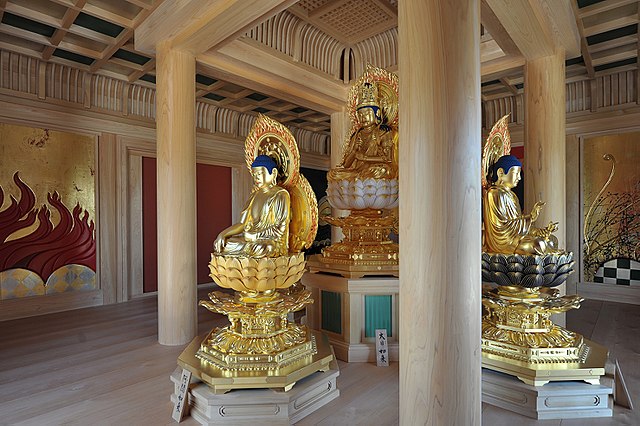Cundī or Cundā is a female Indian Buddhist deity which remains popular in East Asian Buddhism. In Chinese Buddhism, she is associated with the practice of the well known Cundī dharani, which is performed along with a specific mudra, as well as the use of a circular mirror. She is considered to be able to purify negative karma, provide protection, support spiritual practice which allows one to quickly attain Buddhahood.
Hanging scroll depicting the eighteen-armed form of Cundi, China, Ming Dynasty (1368-1644)
Stone statue of Chunda from Sarnath (Uttar Pradesh), time of Gahadavala dynasty, 11th century CE, National Museum, New Delhi.
Shrine and statue of the eighteen-armed form of Cundi from the Mahavira Hall of Lingyin Temple in Hangzhou, Zhejiang, China.
Cundī carving at Xian Dong Yan (仙洞巖), Taiwan.
Buddhism includes a wide array of divine beings that are venerated in various ritual and popular contexts. Initially they included mainly Indian figures such as devas, asuras and yakshas, but later came to include other Asian spirits and local gods. They range from enlightened Buddhas to regional spirits adopted by Buddhists or practiced on the margins of the religion.
Great mandala of the Tôji imperial temple in Kyoto
A statue based mandala with each of the five Buddhas facing his specific cardinal direction at Many Treasures Pagoda, Renge-in Tanjō-ji, Japan
Statue of the Eleven-Headed and Thousand-Armed Guanyin (Shíyīmiàn Guānyīn) with the 28 guardian devas associated with this manifestation at her sides; located at the Guanyin Shrine on Mount Putuo Guanyin Dharma Realm in Zhejiang Province, China
The Buddha with protector Vajrapāni in Greek style resembling Heracles or Zeus, second-century








